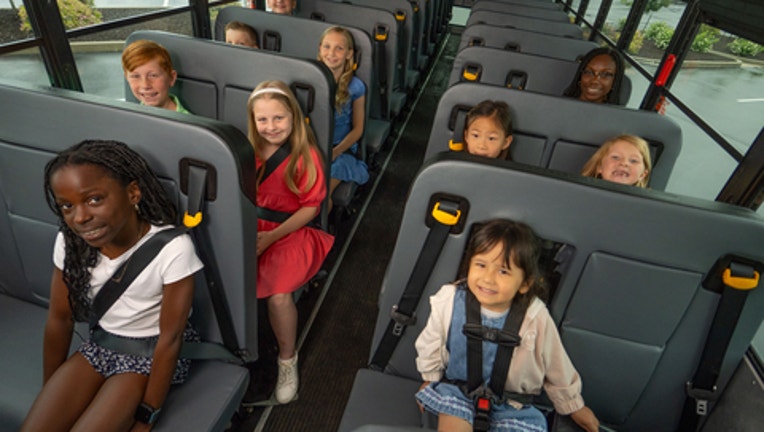Company making 3-point seatbelts standard on all school buses

Blue Bird announced the most comprehensive safety upgrades to its school buses in the company’s history.
LOS ANGELES - Blue Bird Corporation, a leading manufacturer of school buses, is set to implement significant safety upgrades, including introducing three-point seatbelts as standard equipment on all new models starting in the fall of 2024.
This move marks a historic first in student transportation safety.
Based in Georgia, Blue Bird Corporation has been producing school buses for nearly a century and remains the only U.S.-owned and operated school bus manufacturer. The company employs approximately 2,000 team members and is known for its commitment to safety and innovation in the transportation of school children.
The decision to standardize three-point seatbelts comes as school buses remain the largest mass transit system in the United States, with around 480,000 buses in operation.
The company explained in a press release that every weekday, over 25 million children and 175,000 drivers rely on school buses, which collectively cover nearly six billion miles annually.
In addition to the three-point seatbelts, Blue Bird will introduce the 4Front, a steering wheel deployed airbag for bus drivers. This safety feature was developed in collaboration with IMMI, a global supplier of advanced safety systems based in Indiana.
"For nearly a century, our children’s safety has been our business," said Britton Smith, president of Blue Bird Corporation. "We proudly carry millions of school children every year, the most precious cargo in the world. Today we raise the bar even higher for student transportation by announcing the most comprehensive safety upgrades to our school buses in our history."
The safety enhancements include high-intensity LED lighting, high-resolution front and rear cameras, lighted stop arms, school bus signs, and strobe lights. Blue Bird will also incorporate high-tech systems such as collision mitigation and electronic stability control (ESC).
"We are thrilled to partner with iconic school bus manufacturer Blue Bird as their new seating and advanced safety supplier," said Larry Gray, CEO of IMMI. "School buses carry millions of school children every day and literally our nation’s future. We applaud Blue Bird for its bold leadership to make lap-shoulder belts standard safety equipment, while also leading the way to better protect drivers."
With these new safety measures, Blue Bird aims to set a new standard in student transportation, prioritizing the well-being of both students and drivers on the road.
The importance of seat belts
According to the Centers for Disease Control, about 50% of people killed in accidents were not wearing a seatbelt. Seat belts save lives by reducing the risk of injury by 45% and serious injury by 50% in car accidents. They help prevent passengers from being thrown around or ejected from the vehicle.
Thirty-one states have "primary enforcement" seat belt laws, allowing officers to pull you over for not wearing a seatbelt. Eighteen states have "secondary enforcement" laws, where officers can only cite you for not wearing a seatbelt if you're pulled over for another reason.
New Hampshire is the only state without a seat belt law. Despite widespread seatbelt laws, not all school buses are equipped with safety belts.

